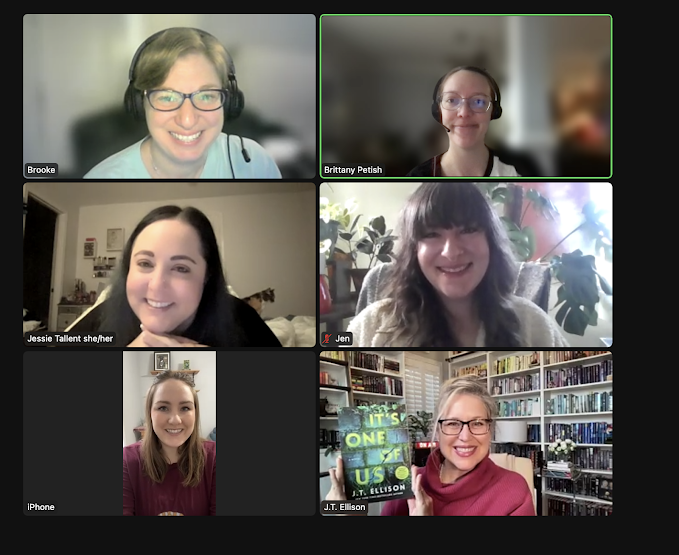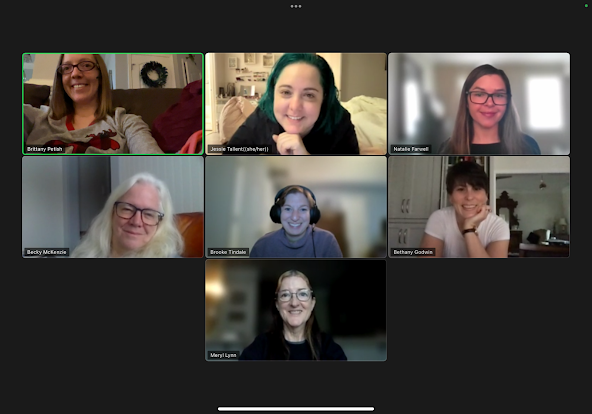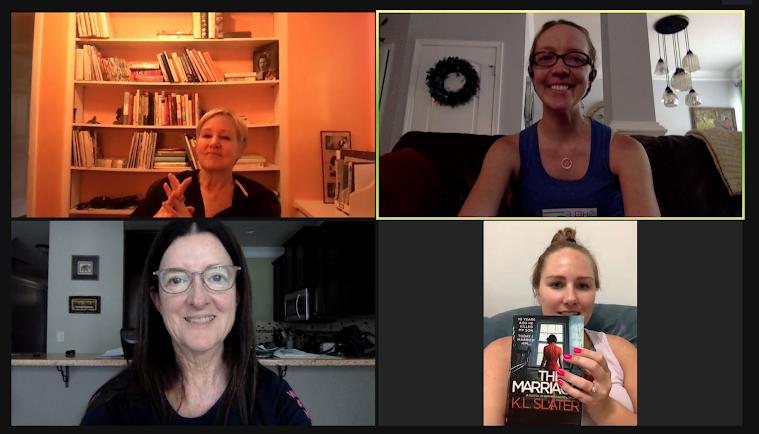A Conversation with Joshilyn Jackson, author of “The Opposite of Everyone”
ArtsATL: Paula Vauss is a fascinating character, full of nuance and passion. How did you create her?
Joshilyn Jackson: Paula is a minor character in [my sixth novel] Someone Else’s Love Story,and she was one of those characters who just kept taking over everything she was in. I probably cut 10,000 words of Paula out of Someone Else’s Love Story. She had the best lines, and I just knew she was going to get her own book.
She’s an iteration of a character I’ve written before in a number of other books, but always in a minor role. She always showed up as a minor or secondary character because it’s hard to have a narrator that is that vicious and relentless and sometimes mean. But she has dimension for the reader because you see her past and you know that she was an underdog. As an adult, she has such a heart for the underdog and she’s oftentimes relentless for people who can’t be relentless for themselves. And she’s very loyal and ethical. Those things save her for me. When I was writing her, I thought no one would love her but me, but I’ve been surprised at the good ways people have been responding to her.
Paula was challenging for me to write because there isn’t much in me that is like Paula.
I am Southern and female and of a certain age, as they say, and I was born when feminism was starting, and I had all sorts of opportunities that my mother didn’t have. I’m a bridge generation. As as a result, I’m super passive aggressive. They put it in the water down here. It’s important to me that people think I’m nice and that they like me. Writing Paula was so fun. Everything I would just think and not say or do, she’ll just say or do. If you don’t like her, she doesn’t care. I want to write more Paula books!
ArtsATL: Kai’s decisions are fascinating — she clearly loves her family, but she is so hamstrung by a variety of issues. How did you decide to only tell the story from Paula’s perspective and not include any first-person information from Kai?
Joshilyn Jackson
Jackson: I actually got a lot of pressure from my writing group to put more Kai in there because she is so interesting, but I was insistent that Paula was going to narrate the story. I think that was the right choice. In the end it doesn’t really matter who Kai was or is, it just matters who Paula says Kai is. I don’t think any of us ever see our mothers as they actually are. There is a lot of baggage that comes from coming out of someone’s body with half of their genetic material.
Kai is probably the character I am most like. Paula is very foreign to me, as I’ve said. I don’t have a lot of Paula in me, but I have a lot in common with Kai. My first run in college, I failed out rather fantastically. I lost a few years. I disappeared and I lived in rented rooms and I worked in traveling theater troupes. I don’t know if those years made me a better writer, but they helped me create Kai.
ArtsATL: Your book describes the foster care and prison system and the ways they fracture families and impact women. Why did you decide to include this in your book?
Jackson: I wanted to look at the ways institutionalizing women tears families apart and why we allow this to happen. Prisons should exist but they need to be reformed. Is it really necessary to remove mothers from children and force children into the foster care system over pot? But I also wanted to think about the injustice of the system in a broader way.
Over a decade ago, I was arrested. It was for a clerical error at the Social Security office. I live under my married name but am published and paid under my maiden name. The record was expunged and my name was cleared. I was never at fault and they were completely in the wrong, but nonetheless a warrant was issued for my arrest.
One afternoon as I was driving my minivan to a TV interview, I was pulled over for speeding, which I was actually doing. And all of a sudden, they have me in handcuffs because of this warrant that I knew nothing about and that had nothing to do with me. But that didn’t matter. They ceased treating me like a person. All at once I was thrown into the backseat and taken to a jail cell. My husband was out of town. I called our family lawyer, who handles our wills, to see if he could help, but he was out of town, too. I was sitting in this jail cell really wondering what I was going to do when this very young deputy comes and hands me my cell phone. He says to me: “Ma’am, when we close at 5 p.m., I have to take you to the Atlanta City Jail, and I don’t think you’re going to do well there.” He told me to call everyone in my address book until I found someone who could come get me.
I called Karen Abbott, I told her I was in jail and she says, “I know, honey, it feels that way sometimes. Writing is so hard.” And I had to tell her, “No, I’m in actual jail. Behind bars.” She came and got me out.
As a white middle class woman, no one treats me like I was treated that day, like an object, like someone who cannot be trusted. I had my privilege torn away from me that day, and I was forced to walk in the shoes of people much less fortunate than I am. It was eye-opening.
As the Paula story emerged, I realized that I wanted to investigate these issues. I have done work with the justice system. I have taught at Arendale State Prison, a correctional facility for women, and these are issues that I am passionate about.
ArtsATL: How do you use humor in your novels to offset the dark themes and issues you explore?
Jackson: Humor helps people process difficult things, we know that, but I think the humor works against me in a lot of ways, too. Because I’m funny and have two X chromosomes, I am very easy to dismiss. To be fair, I really like plot. If you want to, you can take a drink and my book to the beach and read the whole book and come out completely unscathed. I’ve had people come up to me and say “It’s just so fun.” And that book certainly exists. That is the surface book. But if you’re paying attention, my books are pretty blackhearted.
I think the crux of it is that I’m a re-reader and I write for re-readers. As a re-reader, I want to zoom along the first time and love every minute, but I want enough in there to catch on my brain to make me want to delve in again. I’ll read a book really fast and then I either think “That was delicious” and throw it aside, or I think “Huh, I need to reread it” and put it on a shelf. Then, I’ll reread it until I feel like I’ve gotten it all. I’ve been reading To Kill a Mockingbird since I was 9 years old, and I just read it again eight months ago. Some books I never get tapped out on. Flannery O’Connor is like that for me, too.
ArtsATL: You’ve mentioned that you write from 4 a.m. to noon. Is this a common practice? Do you believe that writers must write regularly — perhaps in the small morning hours — to get their work done?
Jackson: I believe that that works for some people — and when the book is really cooking, I’ll be up writing at 3:30 or 4 — but sometimes I won’t write for weeks. It’s not ready yet. I haven’t fully imagined it yet. If I did write, I would just throw it out. It wouldn’t be correct or good. “Stewpotting” is an important part of process. Sometimes my husband will come home and find the closets completely rearranged, and I’ll say, “I know what this looks like, but I’ve gotten a lot of work done on the novel today!”
The trick is, though, that I also always get my novels done on deadline. If you can’t complete your novel this way, then you have to do it the other way. The Anne Lamott way is you show up the same time, same place, and that tells your writer brain that it’s time to work. You’ve Pavloved it. For me, that doesn’t work. In fact, once I’ve written a novel in a certain place, I can never write a novel there again. Dancing Goats in Decatur? Totally burned. I wrote Paula there. I go in there and Paula will start speaking. I need a different place for each book.
ArtsATL: Whom do you write for?
Jackson: Lydia Netzer. We went to graduate school together, and I love her and her work. She wrote Shine Shine Shine. She writes for me. If you write for your mother, you can’t put in sex scenes. If you write for everyone, you roll around trying to pander and please and you write a piece of crap. If you write for yourself, you don’t write to be read. I choose my ideal reader, Lydia Netzer, and I write for her. I write to be read. I want to be read. I have something to say. I can’t write for just me.
But it’s a learning curve to figure out who you write for. When I first started writing, the depth and range of how much I would be misunderstood was something I had to learn. People are going to react to a book in various ways. Reading a book is to participate in a conversation, but the author only provides half of that conversation. When I first published, I didn’t know that. I had people who misunderstood what I thought I was saying in such a huge range of ways. And it really hampered me. I then wrote a book in the most mealy mouthed pandering way, trying not to say anything that would possibly be offensive or taken the wrong way by anyone. It was 90,000 words of total nothing. I had to throw it out. And then I realized that people weren’t misunderstanding me, that wasn’t true. They’re in a conversation with my book. They’re not in conversation or a relationship with me. They’re in conversation and a relationship with the story. At that point, I gave up trying to write for anyone but Lydia and things got easier.
ArtsATL: You are in a writing group with Lydia Netzer, Sara Gruen and Karen Abbott. How important is your writing group to you?
Jackson: Hugely important. Undoable, without-able. The key to it is you have to genuinely love their work and be interested in the conversations they’re having. And you have to genuinely love them. When the respect is there for the work and when you genuinely love the person and you only want the best for them, then it can be magical. I think the death of a lot of writing groups and writer friendships is when one person has more success than another and the support isn’t there. If you love your writing group, you celebrate their successes and if something bad happens, there is no schadenfreude. You’re all on the same team.
ArtsATL: How have you grown and changed as a writer over the course of seven novels?
Jackson: I’m less afraid. I’ve learned to have more than one thing to say. I also know with certainty in my heart that I can stop publishing tomorrow, but I will never stop writing.
Reblog Credit: Arts ATL 2016




Comments
Post a Comment
Drop us a line and let us know what you thought about the book...